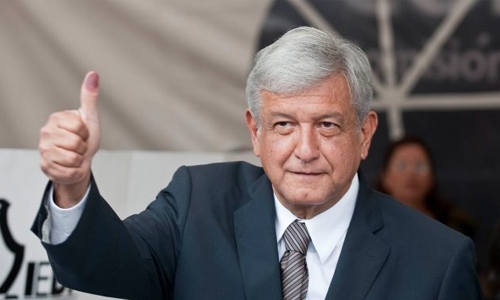Trouble looms for Mexico’s new president
Amid nervous financial markets, a buildup of thousands of Honduran migrants in Tijuana eager to enter the United States, pressure from the Trump administration on immigration and doubts over the eventual ratification of the new United States-Mexico-Canada Trade Agreement by the United States Congress, Andrés Manuel López Obrador was inaugurated on Dec 1 as Mexico’s new president. López Obrador is only the fifth democratically elected president in the country’s history, but he received a broad mandate for change last July.
He takes office during a troubled era in relations between Mexico and the United States, ushered in two years ago when Donald Trump entered the White House. The new Mexican leader will have to concentrate on damage control — because Trump has done a great deal of damage. The danger is that AMLO, as he is widely known, might well aggravate that damage. He is not well equipped for this challenge. Trump upended more than a quarter century of productive, if tense at times, relations between Mexico and the United States, symbolised by the North American Free Trade Agreement, or NAFTA, that came into law in 1994.
By insisting on negotiating a new trade agreement, now known as the USMCA, he introduced a large dose of uncertainty into the trade, investment and logistical cooperation between the two countries. By threatening to build a wall, and actually deporting large numbers of Mexicans from the heartland of the United States, Trump needlessly raised tensions on the border. By pressuring Mexico to intercept Central American refugees and dissuading or prohibiting them from requesting asylum in the United States and by radically slowing down asylum-processing at the border, he contributed to the creation of caravans. And by insisting on the war on drugs, he also accentuated Mexico’s human rights and security crises, mainly created by the previous two Mexican presidents.
Relations came to such a low point that AMLO’s predecessor, Enrique Peña Nieto, didn’t visit Trump in the United States or meet with him as president in Mexico. This was the first time in the modern history of bilateral relations. López Obrador has to deal with this situation, and doing so will not be simple. He is restricted from the left by his old-style, chip-on-the-shoulder nationalism, his radical base and the perception in Mexico that the outgoing president kowtowed to Washington all too often. He is pressured from the right by politicians concerned with Mexico’s weakening economy (a battered peso and a wilting stock exchange), its integration with the United States and the country’s vulnerability to any type of Trumpian retaliation for perceived or existing sins. The immigration dilemma will top AMLO’s to-do list.
It involves Mexicans in the United States, those still leaving Mexico in large, though smaller, numbers and mainly Central Americans, fleeing from violence and poverty in their countries. The Honduran caravan held up at Mexico’s northern border is a symptom of this challenge. López Obrador may accept Washington’s demands for Mexico to act as a de facto safe third country, that is, where those seeking asylum in the United States are indefinitely “parked,” even if they do not wish to remain in Mexico (and Mexico is anything but a safe country for them). Or else, he faces the threat of border closings or Trump ripping up the USMCA, or both.
Next, the new president will have to ensure that current sanctions on Mexican steel and aluminium exports are removed and that the USMCA is something that the United States Congress will actually approve. With a new Democratic majority in the House, this will be a task more arduous than many believe. As happened 25 years ago, when President Bill Clinton had to struggle with his own party to ratify NAFTA, this time practically every Democratic vote in the House sought by Trump will require a Mexican concession, in annexes or side letters, or on separate issues. Then, López Obrador may decide to go forward with his bold and praiseworthy ideas of legalising the recreational use of marijuana and poppy cultivation to produce painkillers in Mexico. The country imports legal morphine in large quantities and exports illegal heroin.
If he proceeds this way, however, he may face serious reprisals by an American administration concerned about the opioid crisis and drugs in general. Finally, López Obrador’s sympathy for the regimes in Cuba, Venezuela and Nicaragua, given the United States’ animosity toward them, will add more tensions to the relationship. If AMLO and his team had any experience in handling these matters, or if Trump showed any inclination to back off on trade, immigration and drugs with Mexico, all of these disagreements could be managed, as they have been in the past.
Neither of these two conditions exists today. As long as nothing occurs that threatens Mexican economic stability, this state of affairs is regrettable but tolerable. But if a crisis, like Mexico’s economic and financial meltdown in 1994-95, were to arise, neither the American president nor López Obrador is well-suited to confront it. Trump’s constant manipulation of immigration issues for domestic politics and López Obrador’s penchant for impetuous and poorly thought through decisions work against the type of crisis management that both governments produced a quarter of a century ago.
Misguided policies like the cancellation of a new Mexico City airport by AMLO via popular referendum; the authoritarian drift seen in the militarisation of Mexican public safety and law enforcement; the sending of American troops to the common border by Trump, and his insistence on building a wall along the border and recklessly imposing trade sanctions all show just how trigger-happy both leaders can be. The Mexican economy has collapsed at least four times over the past 40 years. It can happen to any country. But not all countries can prevent collapse, or fix it. López Obrador and Trump are on their own, together and terribly mismatched. Hoping that everything will work out is perfectly understandable, and perfectly naïve. Troubled times, indeed.
Related Posts

